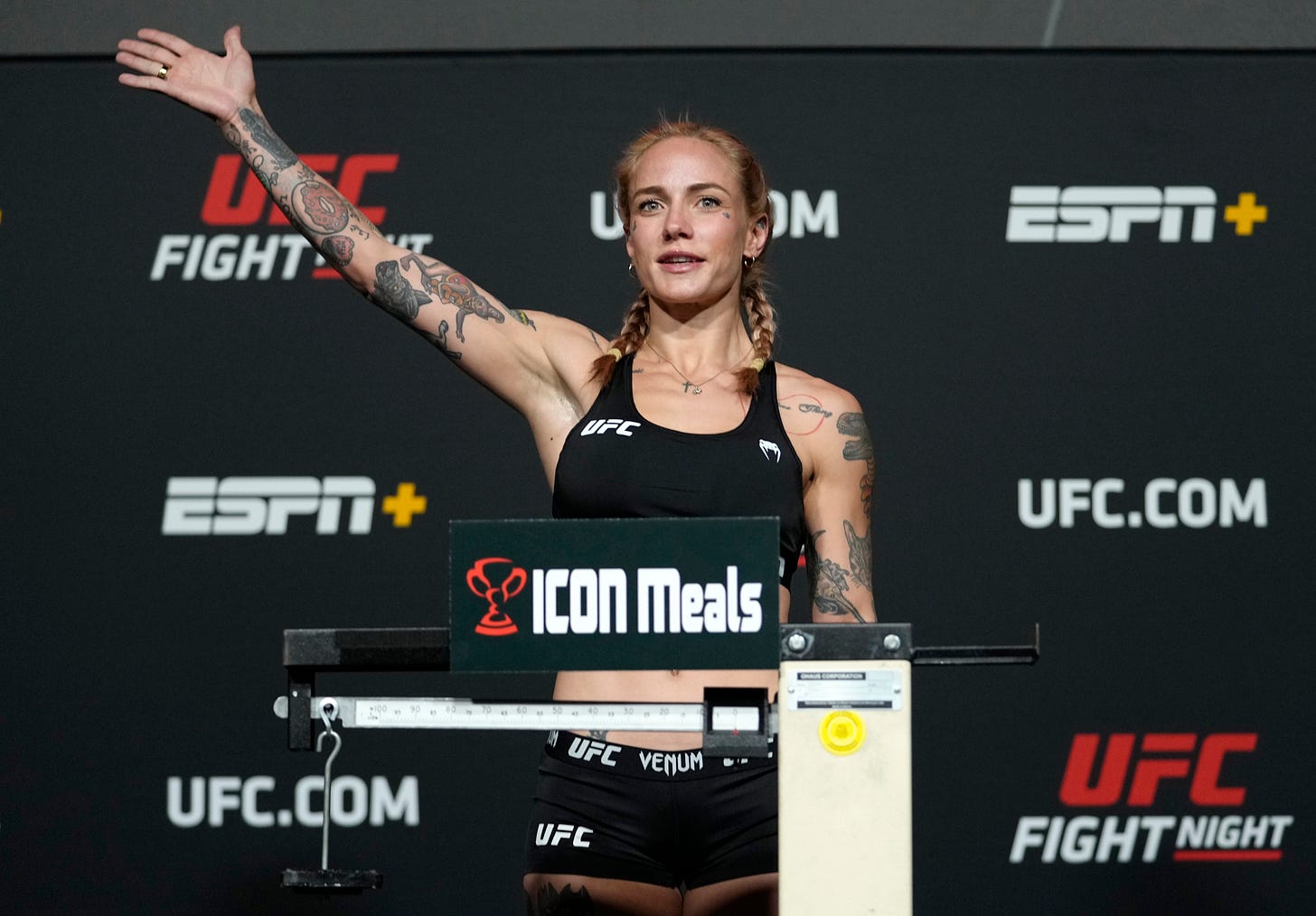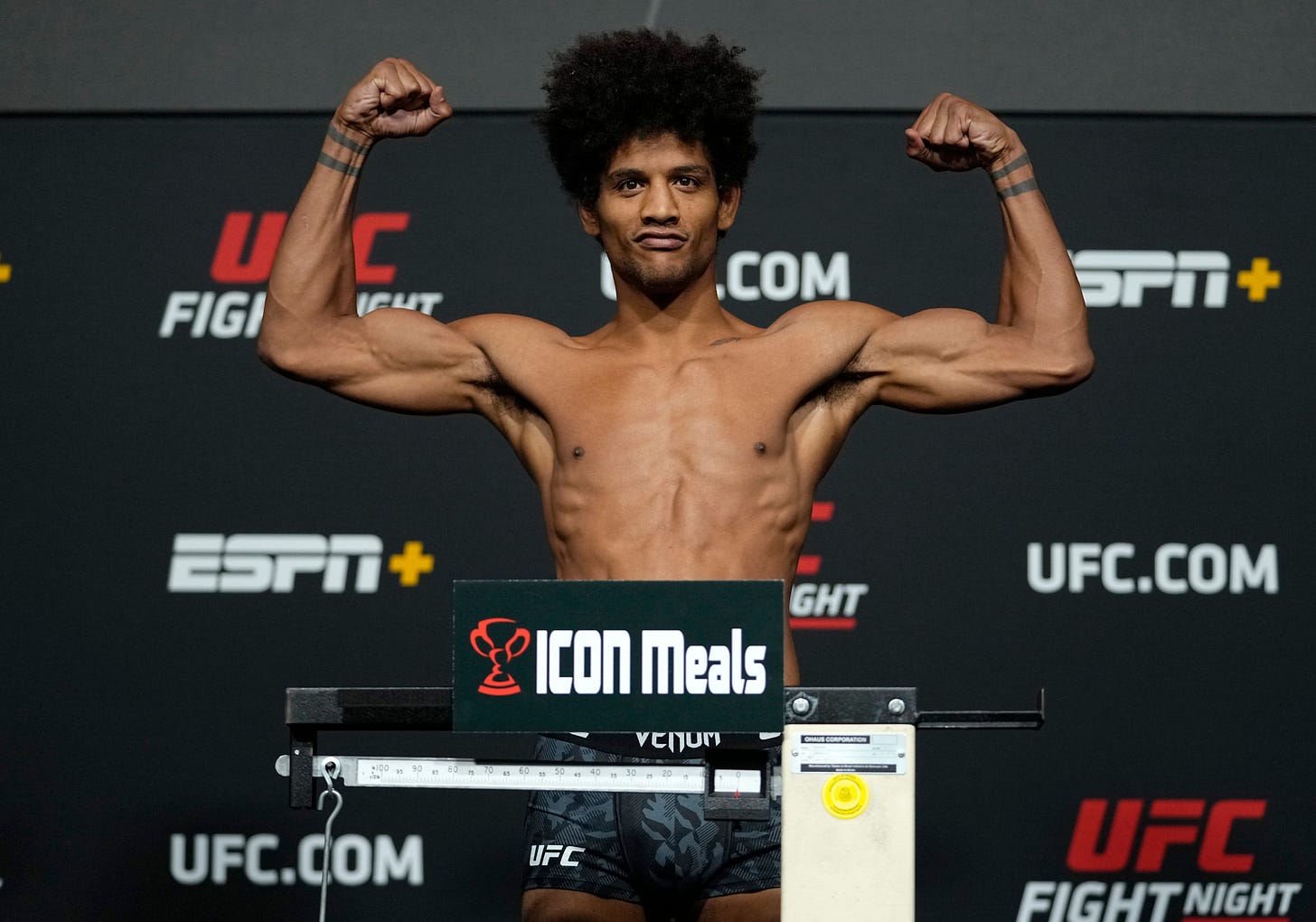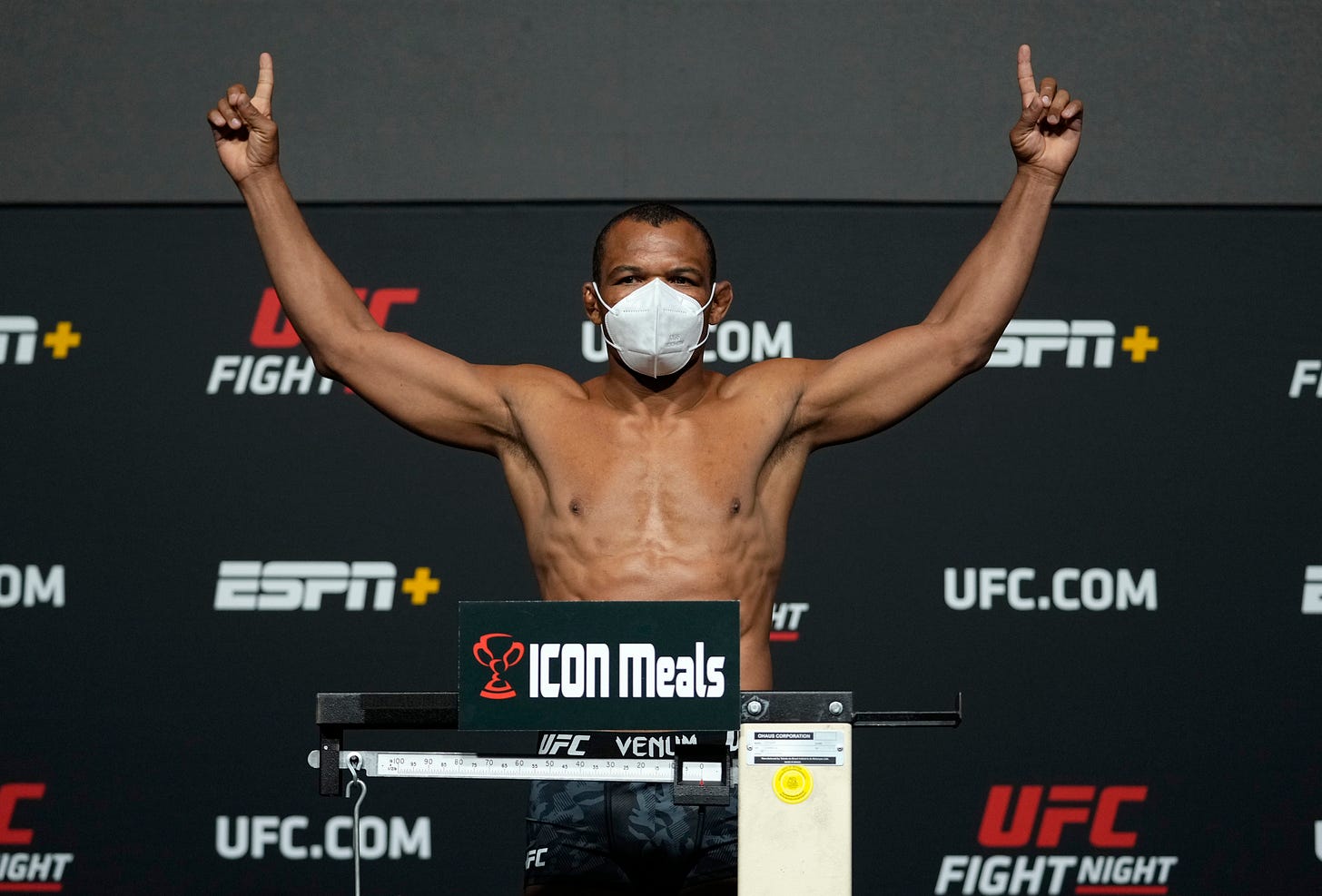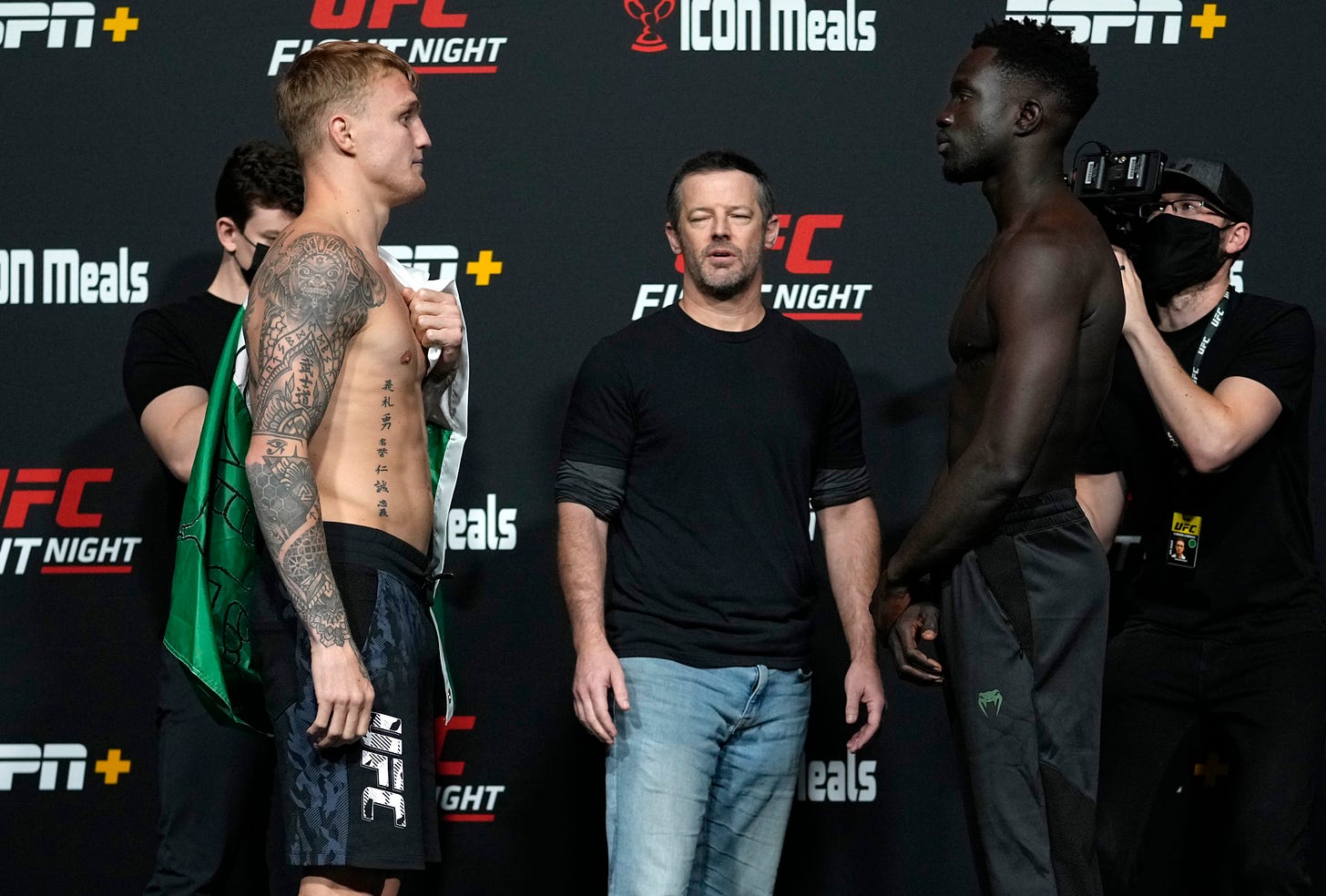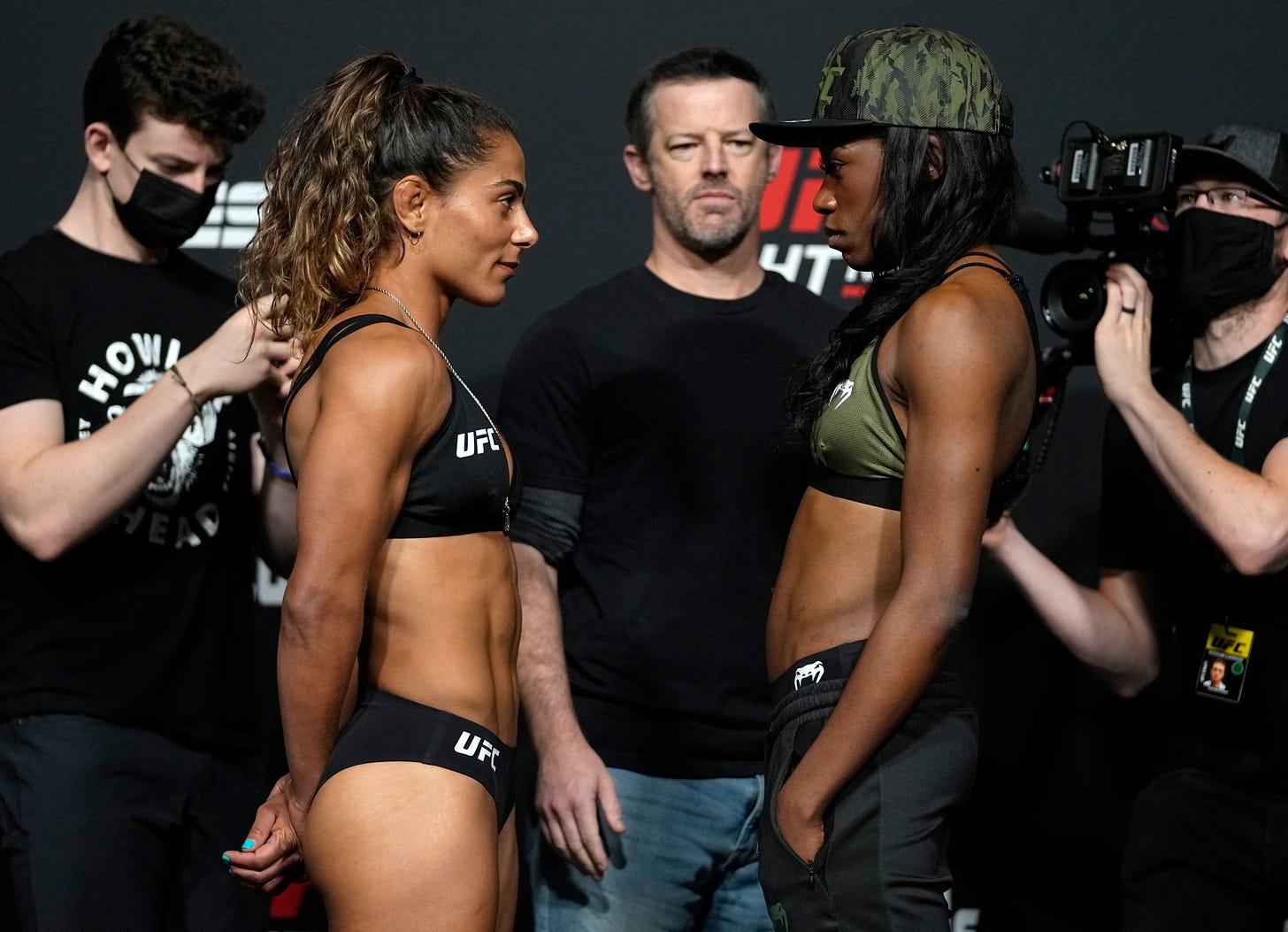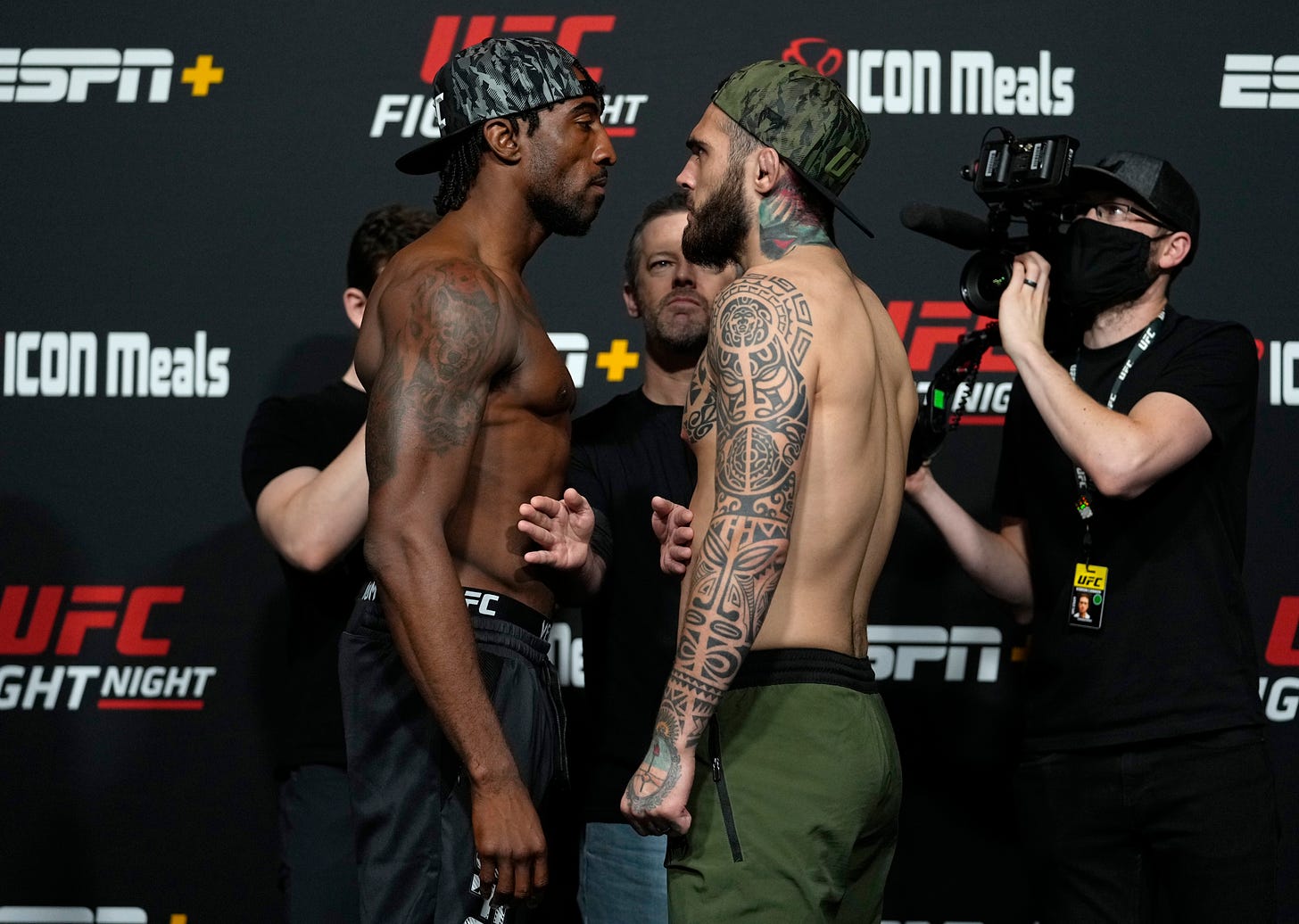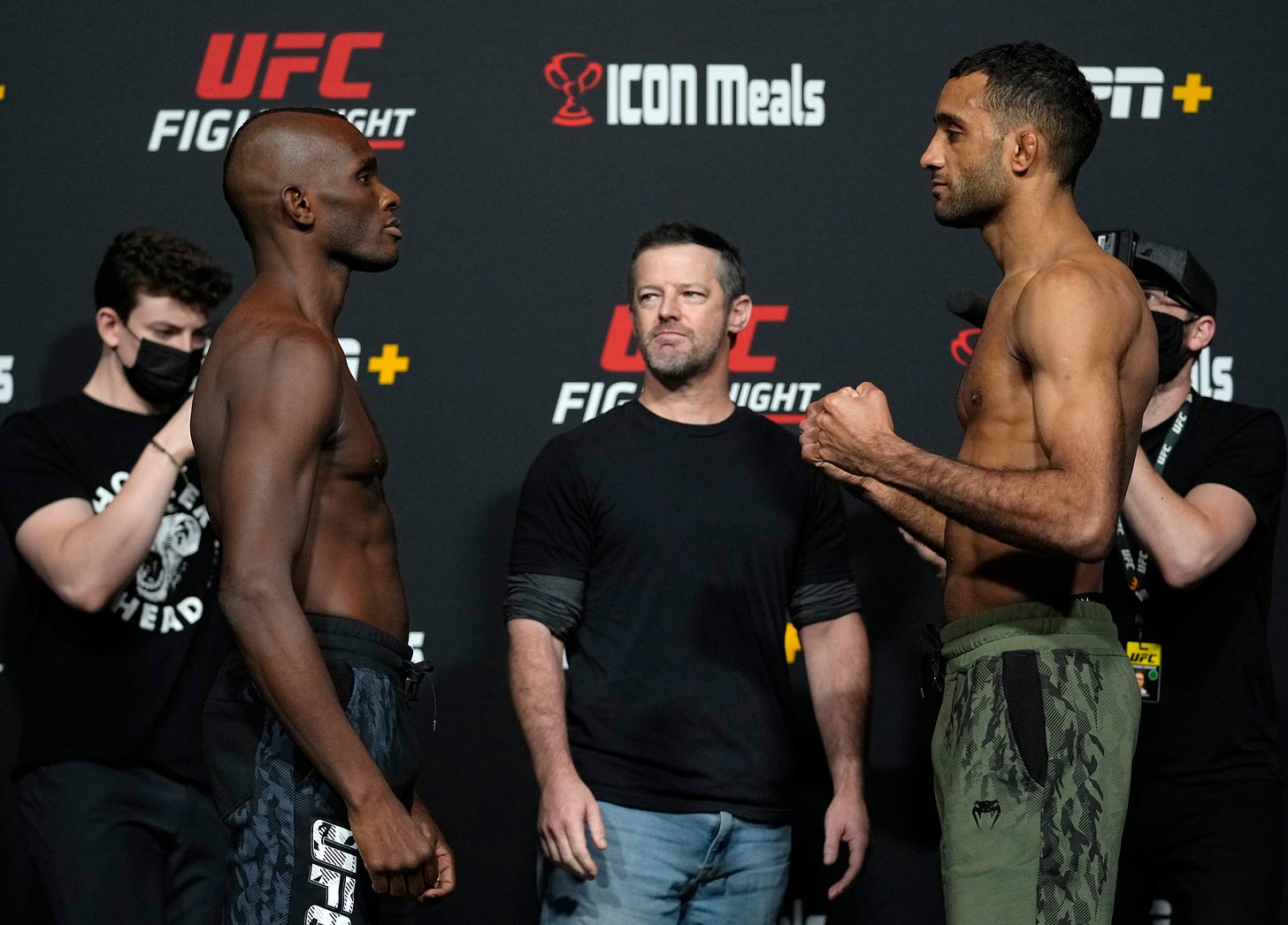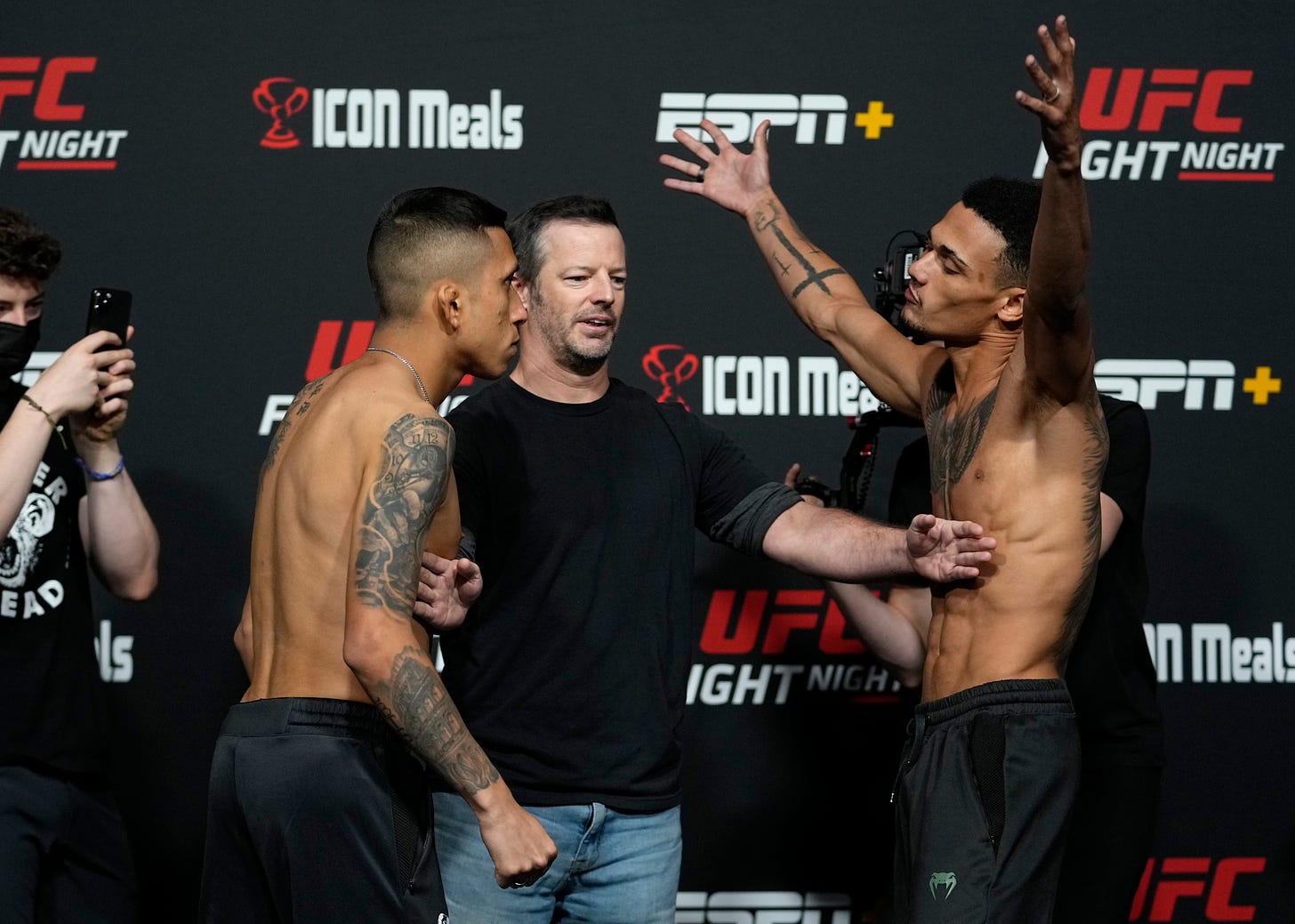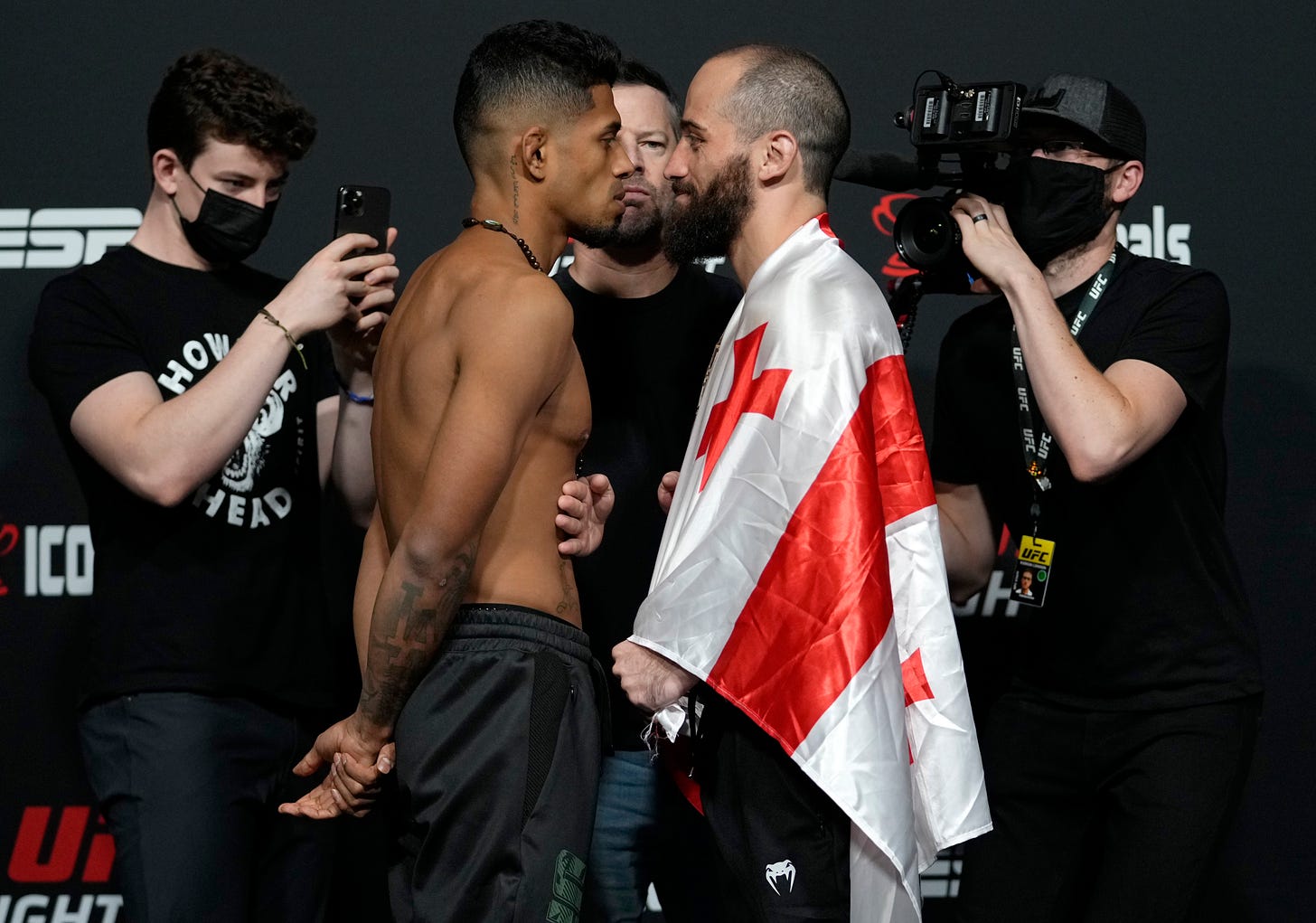UFC Vegas 41: About Saturday in Las Vegas...
Offering thoughts on the action from inside the UFC APEX on Saturday, capped by an entertaining clash between Paulo Costa and Marvin Vettori
Vettori Victorious, Costa’s Prediction Correct
As much as everyone vilified Paulo Costa for his renegotiating the weight for his main event clash with Marvin Vettori twice during Fight Week, one of the cases the Brazilian made for skipping the weight cut was that a clash with the Italian menace would be far more entertaining if neither of them had to both depleting their bodies.
And you know what? He was right.
Saturday’s main event unexpectedly went all 25 minutes, with Vettori earning a unanimous decision victory in a wildly entertaining scrap where both men had their moments and each flashed their toughness and tenacity.
Vettori showed tremendous poise and patience in this one, never getting too aggressive and working at a consistent pace throughout. In a fight where you would have expected “Angry Marvin” to get too emotional, the recent title challenger did a very good job at remaining measured. As for Costa, he seemed tired three minutes into the fight, but was still there firing off heavy shots late in the fight, hanging tough throughout the back-and-forth contest.
While he went about it the absolute worst way possible, you have to admit: this fight was much more entertaining with neither of these guys having dehydrated themselves to make 186 pounds on Friday morning, as each was able to take big shots throughout the contest and push through obvious fatigue to battle hard to the final horn.
Dawson Shines Early, Glenn Rallies Late
Grant Dawson thoroughly controlled Ricky Glenn over the first two rounds of their co-main event pairing, logging nearly eight minutes of control time combined in the two stanzas, looking like he was on his way to a lopsided victory over the veteran Midwest grinder.
But a funny thing happened on the way to Dawson’s clear victory — the emerging lightweight tired, and Glenn got after it, closing out the fight by clamping down on a D’Arce choke that likely would have finished the fight if there were 10 more seconds remaining. As it turned out, Glenn’s third-round efforts were enough to merit 10-8 scores from two officials, leading to the fight being ruled a majority draw.
This was an entertaining grappling match and one that should provide key building blocks for both athletes going forward, with Dawson coming away knowing he needs to further improve his conditioning, and Glenn recognizing the need to work back to his feet quicker when he gets taken down. While both would have preferred to come away with a victory, the fact that neither comes away with a loss is a solid result overall, as each man can take a slight step forward in the talent-rich division and work forward from there.
This was the right verdict too — Glenn flat out dominated the final five minutes, landing 23 of 28 significant strikes while earning 4:27 of control time and nearly securing a finish.
Clark Dominates, Analysts Focus on Criticisms
Jessica-Rose Clark turned in a dominant wrestling performance on Saturday’s main card, setting a new personal best for takedowns in her 30-27 clean sweep opposite Joselyne Edwards in her return to the Octagon following an ACL repair.
The story of the fight, however, was the commentary, which was… not great, Bob.
From repeatedly incorrectly stating that Clark had been out of action for two years (she fought in September 2020) and hammering on the Australian bantamweight for not taking more chances after getting the fight to the canvas. Throughout the contest, but especially in the third, the analysts pleaded for more action from Clark, turning her dominant comeback effort into a chance to push the “we want action at all times” viewpoint that we constantly hear from impatient fans that are only here to see people get knocked out.
When so much of the commentary features the analysts framing things by saying, “I’m not trying to be overly critical,” it means they’re being overly critical. While there is certainly room for suggesting a fight do more and take more chances, this felt like overkill and took away from what was a solid return to action for the 33-year-old veteran.
Five and Counting for Alex Caceres
You have to give it up for Alex Caceres.
Saturday afternoon, the veteran featherweight got blasted with an illegal knee midway through the opening round of his intriguing clash with surging South Korean Seungwoo Choi. The fight continued, but Caceres couldn’t catch up with Choi on the feet, resulting in the opening round finishing as a draw on the scorecards. Early in the second, it looked like it was going to be more of the same, as “Sting” continued walking down the TUF 12 graduate, but just passed the midway point of the round, Caceres jumped onto Choi’s back and started hunting for a submission, securing and finishing the choke once the fight moved to the canvas, completing the improbable comeback.
Caceres has been in the UFC for more than a decade and Saturday’s contest was his 25th in the Octagon, and he’s never looked better. Saturday’s win extended his winning streak to five, equalling the longest unbeaten streak of his career, and he’s shown a wealth of skill development and mental improvements during the course of this run. After years of being a bit flaky and struggling with inconsistency, “Bruce Leeroy” is really putting things together nicely and has quietly worked his way into a position where a date with a ranked opponent next makes a whole lot of sense.
Francisco Trinaldo’s Quietly Impressive Career
Francisco Trinaldo continues to have a quietly impressive UFC career, earning his first victory at welterweight, giving him wins in three weight classes over 24 appearances inside the Octagon.
The Brazilian veteran secured a split decision victory over Dwight Grant on Saturday, surviving a point deduction in the third round for a gnarly eye poke to get the nod on two of the three judges’ scorecards. It was a close scrap through the opening 10 minutes, with Trinaldo landing the heavier blows in the first and Grant securing a knockdown in the second before “Massaranduba” ran away with things following the eye poke, putting Grant on the canvas and controlling him there through to the final horn.
Trinaldo is never going to be one of those guys that gets a ton of praise for what he’s done inside the Octagon, but he’s put together a very strong resume overall, sharing the cage with a ton of talented fighters during his lengthy stay at lightweight and continuing to be competitive now that he’s moved up at an age when most fighters are moving on from the major leagues. He’s never been a contender and he won’t get there at welterweight either, but you have to give it up to the tenured talent for all he’s accomplished and where he’s at this deep into his career.
What’s the Point of Replay if You’re Not Going to Use It?
The finishing sequence in the main card opener between Nicolae Negumereanu and Ike Villanueva was one of those instances made for instant replay.
After shaking Villanueva’s equilibrium with a hook that landed behind the ear, Negumereanu landed multiple blows to the back of Villanueva’s head — not intentionally, but clearly — as referee Mike Beltran came in to halt the action. Villanueva complained right away, pawing at the impact zone on the back of his head, and the televised replays showed at least two clear instances where Negumereanu connected with the back of the head. Nonetheless, the Romanian was declared and announced as the winner, which feels like an error.
This was a perfect instance to utilize replays and get things right, but instead, nothing was done, and it makes little sense. Just a few weeks after overturning the result of a fight that continued for another 60 or 90 seconds because of a clash of heads, not doing the same here doesn’t make sense to me, especially when Villanueva protested right away.
If you have replay available, why not double-check, just to be safe?
Make it make sense to me, please.
Preliminary Card Thoughts
Gregory Rodrigues (right) closed out the prelims with a come-from-behind knockout win over Junyong Park, finishing things with a hellacious uppercut along the fence.
The Brazilian controlled the action on the canvas in the first, settling into back mount with a locked on body triangle, following Park wherever he rolled, maintaining his position and looking for openings while leaving the South Korean playing defence for much of the opening five minutes. In the second, Park came out firing and had Rodrigues on the ropes, with both men throwing hands early, often, and with limited regard for their own well being. Just when it seemed like Park was poised to finish, Rodrigues fired back and put him on skates, sending him backwards to the fence and finishing him with a clean uppercut.
“Robocop” has now earned back-to-back wins to begin his UFC tenure and four straight overall, establishing himself as someone to keep track of in the middleweight ranks going forward, especially now that he’s relocated to Deerfield Beach, Florida to train with the Sanford MMA crew.
Mason Jones (left) and David Onama got after it on Saturday afternoon, battling hard for 15 minutes in a thoroughly entertaining back-and-forth that resulted in the Welshman securing his first UFC victory.
Jones lost his debut in a banger against Mike Davis and had a No Contest result last time out against Alan Patrick, who he buried in his post-fight interview, but finally secured a victory here, relying on his grappling in what I’m sure was a tougher than expected clash with Onama, a natural featherweight who took the fight on Monday. “The Dragon” continues to show he’s tough as shoe leather, but that willingness to take shots and trade could catch up to him at some point in the future.
As solid as Jones looked on Saturday, the real takeaway from this one was Onama, who not only proved he belongs in the UFC, but established himself as someone to pay close attention to going forward, because he went shot-for-shot on the feet with Jones and has legitimate power. The Glory MMA & Fitness camp is turning out quality prospects and Onama is definitely one of them, and with a full camp and a return to the 145-pound ranks, he could make some real noise.
Good win for Tabatha Ricci (left) on Saturday, grinding out a takedown-heavy unanimous decision victory over fellow Brazilian Maria Oliveira.
After fighting up at flyweight in her debut and getting dominated by Manon Fiorot, the diminutive “Baby Shark” was back in her natural surroundings, and controlled the action from start to finish, putting the newcomer on the deck in every frame and thriving from top position. She advanced to mount in the second and looked for submissions, but couldn’t find anything, and settled for working over Oliveira with punches and elbows from inside her guard in the third.
Standing five-foot-one, Ricci is going to struggle against some of the taller, more accomplished fighters in the division, but her grappling is sharp, and as she continues developing her hands and learning how to combine the two better, she should have some success and could develop into an interesting addition to the talent-rich 115-pound weight class.
Jamie Pickett (left) snapped a two-fight skid on Saturday night, earning a unanimous decision victory over Laureano Staropoli to replicate the pattern of results he showed on the Contender Series, making good on his third trip into the Octagon. It was a low-volume, slog of a fight and while it’s great for Pickett to get into the win column, the North Carolina native needs to make better use of the weapons and advantages he brings into the Octagon.
Pickett had an 8.5-inch reach advantage on Saturday, but rarely threw his jab; he didn't use his kicks to keep Staropoli at range either. Instead, he welcomed the clinch too frequently and too easily, turning what could have bee a considerable advantage into a non-factor. Though he earned a clean sweep of the scorecards, this was a tougher fight than it needed to be against a former welterweight on a three-fight slide, which isn’t exactly encouraging for Pickett’s prospects going forward.
He has the raw materials to be an interesting addition to the middleweight division — size, power, speed, athleticism — but he’s going to have a hard time finding positive results if he doesn’t believe in himself and trust in his talents more when he’s inside the cage.
Former Cage Warriors lightweight champ Jai Herbert (right) landed on the wrong side of a pair of finishes to start his UFC tenure, but switched positions on Saturday, putting it on and putting away Khama Worthy less than two minutes into the opening round of their preliminary card clash.
A rangy striker who was in tough against Brazilians Francisco Trinaldo and Renato Moicano to begin his run, this was the most comfortable Herbert looked inside the Octagon, opening at range, snapping home long strikes, and pouncing as soon as he recognized that he had Worthy hurt. While the game veteran tried to battle back, a clean left hook took Worthy’s legs out from under him, and the follow up blows on the canvas were academic, as “The Black Country Banger” wrapped up his first UFC win.
The last bunch of Cage Warriors titleholder to transition into the Octagon have been struggling, so it will be interesting to see if Herbert’s victory can kickstart a shift to more positive results for the group going forward.
Jeff Molina (left) continued to show why man expect him to be a factor in the flyweight division sooner, rather than later by securing a second-round stoppage win over Daniel da Silva to push his overall winning streak to nine.
The Contender Series alum and Glory MMA & Fitness representative spent portions of the first round fending off submission attempts from the aggressive Brazilian newcomer, who came out of the gate quickly and attacked at every turn. But whenever he was clear of trouble, Molina was making da Silva pay for being on bottom, and when the came out to start the second, “El Jefe” floored him with a straight counter right down the pipe. He promptly worked to mount, and flattened da Silva out when he gave up his back, securing the stoppage less than a minute into the middle frame.
Just 24 years old and flashing a ton of upside, Molina is a sharp talent and making clear strides between each appearance, which continues to rest both his floor and his ceiling each time he steps into the Octagon.
Shout out to Randa Markos (right) for navigating some tricky spots throughout her clash with Livinha Souza to earn a unanimous decision win and snap her four-fight losing streak.
This was a crucial contest for the Canadian veteran, who was disqualified following an illegal upkick in her last contest and knew she was fighting for her spot on the roster on Saturday. Souza chased some submissions and had Markos is more than a couple dangerous positions, but each time, Markos remained calm, worked free, and put it on the former Invicta FC champion, using her superior strength and control to claim her first win in two years. “Quiet Storm” has been a part of the strawweight division since its inception, and that will remain the case going forward after this stellar performance on Saturday.
Jonathan Martinez (left) got back into the win column with a strong performance against Zviad Lazishvili on Saturday night, stuffing a host of takedowns early before controlling things on the feet the rest of the way to earn the unanimous decision win.
The Factory X Muay Thai representative is emblematic of why the bantamweight division is the best in the UFC at the moment, as the 27-year-old is 5-2 in his last seven (should be 6-1) and is still a couple wins from breaking into the Top 15, but has a chance to grow and get there. He showed sharp defensive wrestling skills against the Georgian newcomer and has always been sound on the feet, mixing his attacks and using all his weapons. It’s fun times in the 135-pound ranks right now, and Martinez should be in the thick of things in that 16-30 range to start next year.






